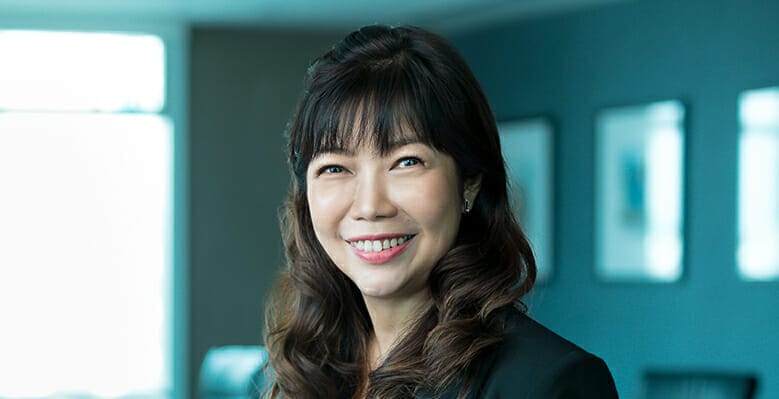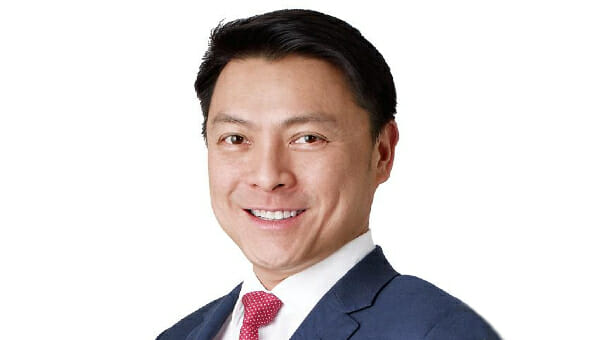
Christina Tan of Keppel (Image: Keppel)
Keppel Ltd has found some like-minded investors ready to bet that making the built environment more sustainable can also boost profits, with the Singaporean group announcing on Monday that it has brought its green urban renewal strategy to $1.7 billion in funds under management with the first closing of a new vehicle.
An unidentified Korean institutional investor backed the first round of capital raising for Keppel Sustainable Urban Renewal Fund (KSURF), with sovereign wealth funds and leading financial institutions, some of which have previously invested in Keppel private funds, participating in the strategy, the firm said. Local media in Seoul identified Keppel’s Korean backer at KB Kookmin Bank, with the institution said to have contributed KRW 100 billion ($74 million) to the vehicle, while the Singapore firm committed an equal amount.
Keppel has linked both regional and country-specific initiatives under the sustainable urban renewal (SUR) strategy, which aims to upgrade existing assets, and invest in value-add platforms that create greener cities and work to reduce climate change. The first investment target for the new fund is said to be the HI Investment & Securities Building in Seoul’s Yeouido area, with Mirae Asset having put that property on the market during the fourth quarter of last year.
“Keppel’s SUR strategy is a unique series of fund products designed to address the urgent call to decarbonise the world’s built environment, with the aim of achieving both strong sustainability outcomes and good investment returns,” said Christina Tan, Keppel’s chief executive officer (CEO) for fund management and chief investment officer, with KSURF being the second vehicle announced under the strategy.
She added that, “The achievement of over US$1.7b in total FUM for our SUR strategy underscores the confidence that our investors have in Keppel’s ability to deliver good risk-adjusted returns and differentiated value-add through our deep operating capabilities.”
$2B Target
With a target fund size of $2 billion, KSURF serves as the flagship fund for Keppel’s Sustainable Urban Renewal (SUR) strategy, and targets capital deployment opportunities in commercial, living, life sciences, hospitality and logistics sectors in Singapore, South Korea, Japan and Australia, as well as in China’s first-tier cities.

Louis Lim, real estate CEO of Keppel
The $1.7 billion closed to date for SUR includes co-investment capital and RMB 1.6 billion ($220 million), along with an unspecified top-up, raised through Keppel’s China-focused Sustainable Urban Renewal venture, which closed in October.
As sponsor of the vehicle, Keppel committed $250 million to KSURF in addition to RMB 160 million it contributed to the China-focused fund.
Keppel has yet to begin deploying capital from the new fund, but a spokesperson said the company has already identified potential seed assets and is currently assessing a pipeline of properties for prospective acquisitions.
Sustainable Cities
The vehicle is positioned to respond to a “large addressable market” of existing buildings that need to be decarbonised as part of the global push to mitigate climate change. Under the strategy Keppel said that it aims to rejuvenate older buildings through use of green technology, and to incorporate green design features when redeveloping existing buildings that require a major overhaul or rebuild.
Louis Lim, Keppel’s CEO for real estate, stressed the strategy’s focus on reviving ageing buildings with green technology, AI-powered tools and modern processes to improve operational efficiency and raise the valuation of the assets.
“Keppel’s SUR strategy offers a series of innovative asset enhancement and sustainability solutioning, such as renewable energy, energy and water saving solutions, as well as smart building controls, which aims to provide up to 50 percent energy savings, to create high quality, healthier and more sustainable buildings,” Lim said.
Keppel, which had $41 billion in FUM as of the end of 2023, has been pushing its urban sustainability theme in recent years and embarked on a pair of major value-add projects over the past year.
The company teamed up with Dutch pension fund and asset manager PGGM in January to acquire the office and retail elements of the Wilkie Edge complex in Singapore for S$348 million (then $262 million), with Keppel vowing at the time to employ its sustainable urban renewal capabilities to improve the operational efficiency at the 157,400 square foot property.
That deal came after Keppel in October had announced its $125 million acquisition of a pair of properties in Sydney, Australia for repositioning as school campuses.
The sustainable value-add theme was already visible in Keppel’s investments in 2022, with the company highlighting its role as a provider of “sustainable urban space solutions” when it announced the acquisition of an assisted living facility in Nanjing during December that year.
During that same month Keppel said that it would add sustainability features like high-performance building facades, energy-efficient cooling and heating systems, smart lighting systems and indoor environment monitoring to boost returns from the Samhwan Building in Seoul, when it agreed to acquire the office building for $170 million.
Buy, Fix, Hold
Keppel, which invests actively in the Korean market, is announcing its latest capital accomplishment just six months after it closed fundraising for its China-focused SUR programme late last year.
Anchored by an unspecified global institutional investor, when fully leveraged and invested that China fund is projected to grow to RMB 3.9 billion in assets under management.
Employing new processes and technologies when rejuvenating old buildings provides greener, less costly and faster-to-market alternatives to full-on redevelopment projects, Lim had said at that time, with the company predicting that it could boost valuations for the China properties acquired under the strategy by as much as 15 percent.
Leave a Reply